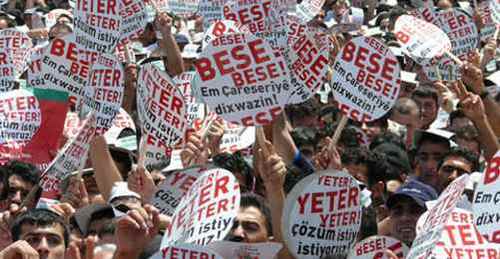Hakan Tahmaz, a spokesperson for the Turkey Peace Parliament, has commented on the speech that Minister of the Interior, Beşir Atalay, made yesterday (31 August).
"Much more hesitant"
Tahmaz said, "I felt that Atalay was much more hesitant and confused than at a previous briefing."
For instance, Atalay avoided the use of the word "Kurdish question" and rather spoke of a "terrorist problem"; he also reiterated that Turkish was Turkey's official language and ruled out constitutional change or a general amnesty.
Tahmaz believes that these are indications that the chauvinist discourse of the opposition has put the government under pressure.
"The government is continuing to spread hope, but its language is becoming more negative."
"The Prime Minister says 'we will continue at any price', but I think they have realised that that is not easy. The ruling Justice and Development Party (AKP) cannot take courageous steps; rather, it is trying to persuade the Republican People's Party (CHP) and the National Movement Party (MHP). However, the CHP and the MHP are stuck in politics that deny the Kurdish identity."
However, Tahmaz does not see the project as "finished": "Turkey has entered a path and it has to walk it; but we don't know if it is going two steps forwards and one step back."
Tahmaz added the following
Relations with the DTP and Kurds: Up to today, there have only been symbolic meetings with the DTP and the Kurds. NGOs with a majority of Kurdish members have not been listened to. The AKP has also categorically ignored dissidents, thus for instance, they have not spoken to the socialists. They seem to want to hold meetings only with those who will strenghten their position. They have met with the families of dead soldiers, but they have not met with the families of dead PKK militants or the relatives of around 5,000 political prisoners.
End operations: At the same time, military operations are continuing. One of the sides, the PKK, has said that it cannot uphold a unilateral ceasefire as long as operations continue. My personal opinion is that the ceasefire must continue, but that the arms on the other side must also be silent.
Öcalan's road map: Certain Kurds see Abdullah Öcalan as having a mission. The road map that Öcalan wrote is currently in the hands of the state, and we, who are part of the debate, have no access to it. There is no point in obstructing its publication, and it is also not legal. Öcalan is expressing his ideas. The road map must definitely be handed over to his lawyers.
We know that what Öcalan says is important for people. If it is obstructed, tensions rise. In addition, Öcalan is the only person who can get the PKK to lay down arms. Why is this being avoided?
With his calls from prison in 1999 and on 1 October 2006, the PKK decided on ceasefires. Especially 2006 is important. On 29 August, the PKK had formulated six conditions for a ceasefire, but with Öcalan's intervention, they froze those conditions and two weeks later, they announced a ceasefire. The state also knows this. Without knowing the content of the road map, the PKK has expressed its support for it. Why should the state know the content of the road map and not we?
PKK ceasefire: I think the PKK is supporting a continuation of the ceasefire because the government would otherwise put pressure on Kurdish politicians. That is why the PKK may prefer to continue the ceasefire until the government announces its propositions.
Freedom of expression: On the one hand, Minister Atalay and the PM are saying that everyone should be able to state their opinions freely, but on the other hand governors are demanding investigations into DTP mayors and politicians. Children are being tried under Anti-Terrorism legislation. But the governors and the Minister of the Interior could stop the security forces from taking children into custody. Steps must be taken to increase a sense of democracy in the country.
Supporters of peace: As the 2011 general elections come closer, there is a competition in nationalism. We must raise our voices of peace against the voices of nationalism. The greatest pressure on the AKP comes from Turkish nationalists. The Turkish public needs to be told why peace is necessary and that Kurds have the right to equal citizenship. (TK/AG)










